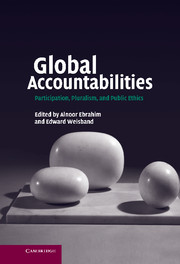Book contents
- Frontmatter
- Contents
- List of tables
- List of figures
- Acknowledgments
- List of contributors
- 1 Introduction: forging global accountabilities
- Part I Public accountability: participatory spheres from global to local
- Part II Experiments in forging NGO accountability: mutuality and context
- 5 Multiparty social action and mutual accountability
- 6 Not accountable to anyone? Collective action and the role of NGOs in the campaign to ban “blood diamonds”
- 7 Bringing in society, culture, and politics: values and accountability in a Bangladeshi NGO
- Part III Reflective accountability: new directions for participatory practices
- Part IV Global accountability frameworks and corporate social responsibility
- Index
- References
7 - Bringing in society, culture, and politics: values and accountability in a Bangladeshi NGO
Published online by Cambridge University Press: 22 September 2009
- Frontmatter
- Contents
- List of tables
- List of figures
- Acknowledgments
- List of contributors
- 1 Introduction: forging global accountabilities
- Part I Public accountability: participatory spheres from global to local
- Part II Experiments in forging NGO accountability: mutuality and context
- 5 Multiparty social action and mutual accountability
- 6 Not accountable to anyone? Collective action and the role of NGOs in the campaign to ban “blood diamonds”
- 7 Bringing in society, culture, and politics: values and accountability in a Bangladeshi NGO
- Part III Reflective accountability: new directions for participatory practices
- Part IV Global accountability frameworks and corporate social responsibility
- Index
- References
Summary
Introduction
Questions of accountability have become important and difficult ones in recent years for nongovernmental organizations (NGOs) working in the development field. The rise of development NGOs during the late 1980s generated considerable expectations regarding their performance strengths and political contributions, but this was accompanied by growing doubts about their ability to maintain appropriate and effective levels of accountability to a wide range of “stakeholders” including users, funders, staff, and government (Edwards and Hulme, 1995). While this accountability critique was initially focused on the section of the NGO community rooted in industrialized countries – often known as “Northern NGOs” – there is a growing recognition that a similar set of structural and relational accountability issues are also faced by NGOs with their roots in developing country contexts.
This chapter reflects on a recent study by the author of research and advocacy work undertaken by a large Bangladeshi NGO, referred to here by a pseudonym, Association for Credit and Empowerment (ACE). The study is considered in the light of issues of accountability and the chapter discusses the complex accountability problems which face even a relatively successful Southern NGO. The broader contribution of this chapter to the study of “global accountabilities” lies in its exploration of the cultural embeddedness of accountability systems. To truly understand the effects of accountability on organizations, it is useful to examine them in context: within configurations of power and social institutions.
- Type
- Chapter
- Information
- Global AccountabilitiesParticipation, Pluralism, and Public Ethics, pp. 131 - 148Publisher: Cambridge University PressPrint publication year: 2007
References
- 4
- Cited by

